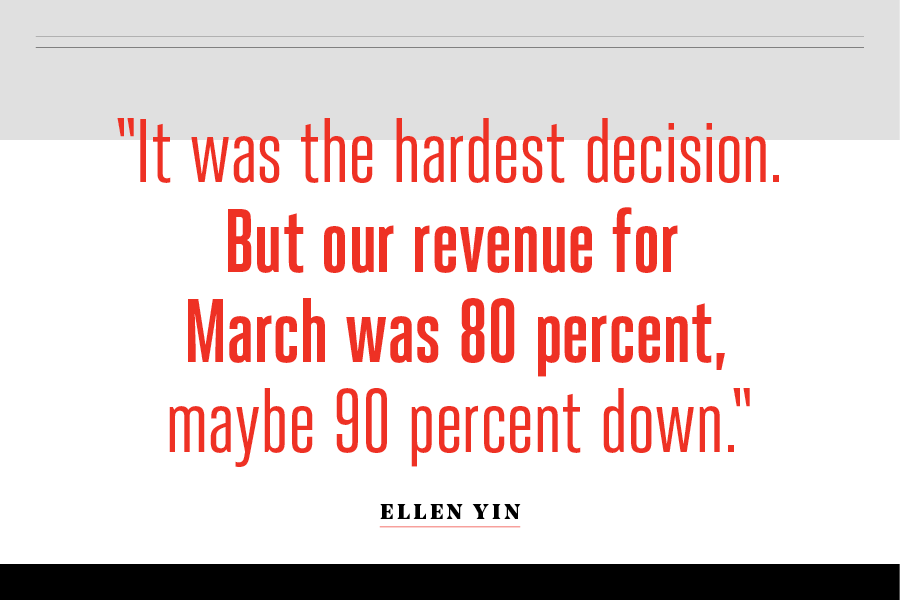My Pandemic Story: High Street Hospitality Group’s Ellen Yin on Having to Lay Off Her Staff
The high-profile restaurateur on how the coronavirus crisis has decimated the dining scene.

High Street Hospitality Group co-owner Ellen Yin shares her coronavirus experience.
Published as a part of the “This Is My Pandemic Story” article in the May issue of Philadelphia Magazine. Here, Ellen Yin, High Street Hospitality Group founder and co-owner, shares her experience.
Our last night of service was Sunday, March 14th. I mean, it started before that. In early March, before we knew anything, it was private events canceling. Then the conventions. First it was just a couple, but then it seemed like every call was a cancellation.
At Fork, we took out tables so there’d be more space between people. And that last week … I wouldn’t say it was a bad week. But then the shelter-in-place orders came in for the surrounding counties, and I thought it would only be a matter of time before the city did it, too. As much as I didn’t want to lay anyone off, we ended up having to lay off almost everyone.
At High Street on Market, the bakery supplies bread to Giant Heirloom Market. With everyone trying to stock up, the orders were doubling. That was enough to keep the bakery open. And then with the breads and pastries, we’re able to do takeout and online ordering. But I knew takeout wouldn’t work with Fork, and when Penn closed the campus, High Street Provisions had to close. So we had maybe six employees still working, at the bakery and doing takeout. It was the hardest decision. But our revenue for March was 80 percent, maybe 90 percent down.
At Fork, we had a meeting with everybody, and someone asked: Is it even legal for all of us to be in this room together? With A.Kitchen, I wanted to be able to talk to everybody, but we had to do a conference call. I had to tell them we were shutting down, and obviously this isn’t going to be just two weeks. And then we lost one of our colleagues. It was a drug overdose. And it raised the issue that so many people in this industry need help. Not just with food and their paychecks, but with mental health, too. So we’re working on a program to offer online mental-health help to people in the industry. We’re working on it.
Anyway, that was the first week.
The second week was about getting used to the new rules. The social distancing. And it was about doing all this paperwork. The Paycheck Protection Program has already crashed my computer three times today, and now my password won’t work. My team is worried about getting their unemployment checks on time. My business interruption insurance? I’ve paid maybe a half a million dollars to them over the years, and of course my business has been interrupted, but viruses are exempted.
But still, you see the positive side of people. A former manager and her mother-in-law raised a thousand dollars to feed medical workers. I have a friend at US Foods organizing donation drives. At 5th and Market, where there’s that construction and it narrows? People are actually not rude about it now. They smile. Even in their masks, they smile.
I walk home at night, and the city is desolate. I see the restaurants all closed, and I know they will open again, because people will want to go out to restaurants. But then I see something like a movie theater, and I think, Who will want to go to a movie after this? I don’t know.
I feel confident that things … I feel confident we’ll reopen again. I know that. But I don’t know if things will ever be normal.
Published as part of the “This Is My Pandemic Story” feature in the May 2020 issue of Philadelphia magazine.


